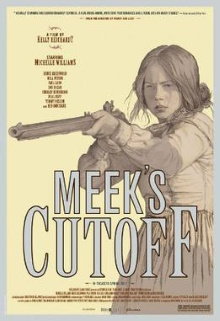Kelly Reichardt is probably my current favorite American director and this is another film that cements my love for her style. The Oregon Trail game was really before my time but I too briefly tried it and raged over how every one of your pioneers seem to eventually die of dysentery. Well, this is the story of one small group lost on that trail. As with Reichardt’s other films, the plot is straightforward and simple. It really is all about giving the audience an idea of what it was like to be a settler on the trail in 1845, complete with all of their trials, dreams and prejudices.
A small group of settlers travelling with three covered wagons splits off from a larger convoy to follow a guide Stephen Meek who claims to know a shorter route. After five weeks on the trail however, they become convinced that he has either exaggerated his familiarity with the area or is deliberately misleading them. As their food and especially water run low, tensions rise and they become increasingly unhappy. At one point, Meek brings them to a large body of water only to later declare that it is undrinkable due to being too alkaline. While collecting firewood one of the wives Emily Tetherow notices a native Indian nearby and takes fright. Meek regales them with stories of him fighting and killing Indians and warns them that the one Emily spotted is probably hostile and aggressive. The next time he is seen, Meek and Emily’s husband Solomon manage to capture him. Meek wants to kill the Indian immediately but Solomon hopes that he can lead them to water, despite their inability to communicate with him.
As befits Reichardt’s slow, minimalistic style, this really is all there is to the film. There are no flashbacks, no dramatic twists, no characters other the group of settlers and the Native American they come across. Instead what we get is mile after mile of them trudging through the plains and grasslands of Oregon. Most of them are on foot, even the women and the lone child with them, as the wagon are used only for their supplies and possessions. When they do find water, they rush to wash their clothes and get other chores done. We watch them set up camp every night, say their prayers, eat their food. In this way, we also hear their manner of speech and learn a little about the types of people who would attempt to make their fortunes by travelling out west. It’s tedious, exhausting and disheartening as they wonder every day just how much longer they have to go and I imagine that’s just what it must have been like for the real settlers on the trail. Yet accompanying this arduous journey are the spectacular colors and scenery of the state, captured in an impressive feat of cinematography. There is almost no music and there is no need for it and these simple shots of them walking along and going about solving mundane problems are more than enough to fill the entire world of this film.
I was surprised to learn that Stephen Meek really existed and this story is loosely based on a real event. It is instructive to realize however that the convoy he lead consisted of around 200 wagons and over 1,000 settlers. These kinds of numbers make it a lot more understandable how they were confident enough to brave such a difficult journey over potentially hostile territory. That does mean that this film captures only a bare fraction of the settler experience. Interestingly in reality Meek seemed to have been rescued with the help of Native Americans from the wrath of settlers angry about their family members dying over the course of the trip. The film doesn’t encompass what the arrival of the settlers would eventually mean for the Native Americans. It does show that they have language and culture of their own and how they are mistreated by the newly arrived white settlers. I did like how it shows the women here are not expected to have a say in the deliberations over what to do. When the men huddle to discuss whether to continue to put their trust in Meek, the women are left out and are not even informed about what is happening.
This film is a bit too impersonal and distant from the audience to be truly affecting and we of course lack the same kind of affection that Reichardt clearly has for the state of Oregon and its history. Still it’s an event that is part of the American cultural heritage and this is a brutally straightforward depiction of one small part of it. Even if you don’t much care for it, this is a beautiful film and I loved the incredible detail it provides on the the practical aspects of life in the mid 19th-cemtury. As far as I’m concerned Reichardt keeps going from strength to strength and is one of the best currently working directors of slow cinema.
